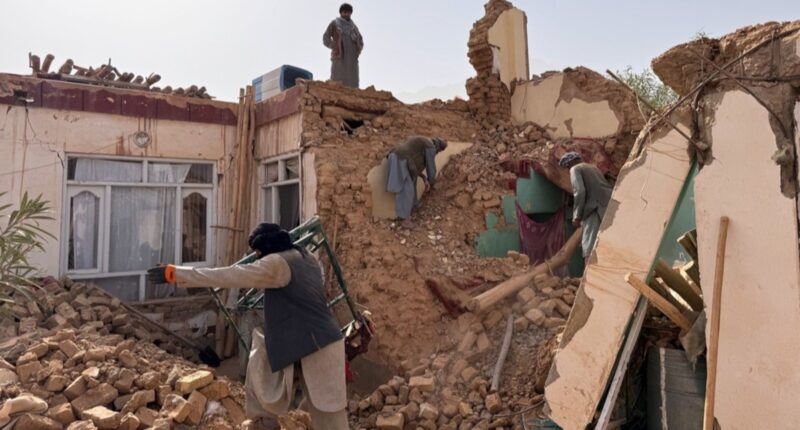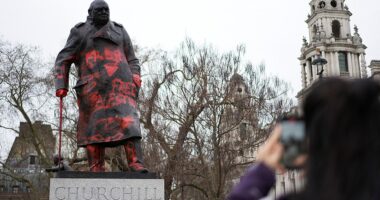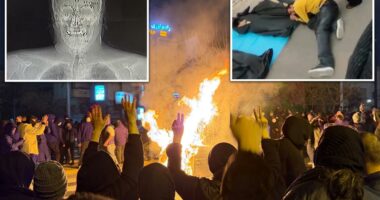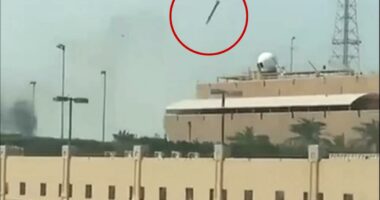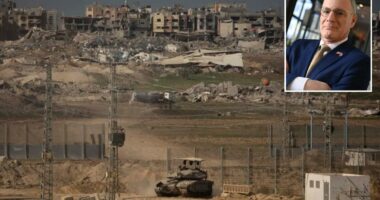Share this @internewscast.com
Before dawn on Monday, a significant earthquake measuring 6.3 on the Richter scale rocked northern Afghanistan, claiming the lives of at least 20 individuals and injuring over 640 more, according to officials. The quake also inflicted damage on the historic Blue Mosque, a cultural treasure.
Authorities indicated that the toll of casualties might escalate as more information emerges.
In the vicinity of Khulm, near where the earthquake struck hardest, residents armed with shovels sifted through the remains of mud-brick homes, desperately trying to recover any belongings from the debris.
Ahmad Zia, a local inhabitant, described the air as thick with dust from the destruction. “We retrieved the bodies of two individuals from the wreckage, and their funerals are set for today,” he shared.
Social media footage from Mazar-e-Sharif, the capital of Balkh province in the north, revealed that the Blue Mosque had lost a few bricks from its walls, yet its structure stood firm. This centuries-old edifice is among Afghanistan’s most cherished religious sites and serves as a focal point for Islamic and cultural celebrations.
Afghanistan, often struggling to cope with natural calamities, particularly in isolated areas, faces additional challenges due to its infrastructure. Buildings are typically low-rise, composed of concrete and brick, while homes in rural outskirts are constructed from mud bricks and wood, frequently lacking in structural integrity.
In August, a quake in eastern Afghanistan killed more than 2,200 people.
Hundreds of houses destroyed
The U.S. Geological Survey said the quake’s epicenter was located 22 kilometers (14 miles) west-southwest of the town of Khulm, and that it struck at 12:59 a.m. at a depth of 28 kilometers (17 miles).
The deputy spokesman for Afghanistan’s National Disaster Management Authority, Qari Taj Mohammad Hemat, said the earthquake had struck Balkh, Samangan, Sar-e-Pul, and Kunduz provinces and had left 20 people dead and 643 others injured, of whom 25 were in critical condition.
Earlier, Sharafat Zaman, a spokesperson for the Ministry of Public Health, said the dead and more than 500 of the injured had been brought to hospitals in Balkh and Samangan provinces. Rescuers were on the scene and the figures were changing, he added.
In the nearby province of Badakhshan, the quake partially or completely destroyed 800 houses in one village in the Shahr-e-Bozorg district, said Ihsanullah Kamgar, spokesperson for the provincial police headquarters. But with a lack of internet in the remote area, there were still no accurate casualty figures, he added.
Yousaf Hammad, a spokesman for Afghanistan’s disaster management agency, said most of the injured suffered minor wounds and were discharged after treatment.
Another resident of Khulm, Abdul Mubin, said he had been sleeping in his shop when the earthquake struck. “I saw that everything was destroyed. People had suffered a lot of financial losses,” he said. “Many people’s houses were destroyed and their household goods were under the rubble.”
Rockslide briefly blocks highway
The Ministry of Defense announced that rescue and emergency teams had reached the quake areas in Balkh and Samangan, which suffered the most damage. The teams were transporting the injured and assisting others, it said.
The Taliban government’s chief spokesman, Zabihullah Mujahid, posted on X that government organizations were working to get the help needed.
The quake was also felt in the capital, Kabul, and several other provinces. The Defense Ministry said a rockslide briefly blocked a main mountain highway linking Kabul with Mazar-e-Sharif, but the road was later reopened. It said some people who were injured and trapped along the highway were transported to the hospital.
In Islamabad, Pakistan’s President Asif Ali Zardari expressed his deep sorrow and grief over the loss of lives. In a statement, he offered condolences to the families of the victims, prayed for the swift recovery of the injured, and said that Pakistan stands with the Afghan people in this difficult time.
His statement came as the two countries were engaged in rounds of peace talks amid heightened tension after deadly clashes on the frontier between Afghanistan and Pakistan left dozens of soldiers and civilians dead on both sides. Pakistan accuses the Taliban government of sheltering members of the Pakistani Taliban and failing to curb cross-border attacks. Afghan officials reject the allegations, saying they seek good relations. Another round of peace talks is scheduled for this week in Istanbul, Turkey.
The United Nations in Afghanistan said on X that its teams were on the ground assessing needs and delivering urgent aid.
“We stand with the affected communities and will provide the necessary support,” the post said.
A magnitude 6.0 earthquake hit eastern Afghanistan on Aug. 31 near the border with Pakistan, killing more than 2,200 people. On Oct. 7, 2023, a magnitude 6.3 quake followed by strong aftershocks left at least 4,000 people dead, according to the Taliban government.
___
Associated Press writer Munir Ahmed in Islamabad contributed to this report.
.
